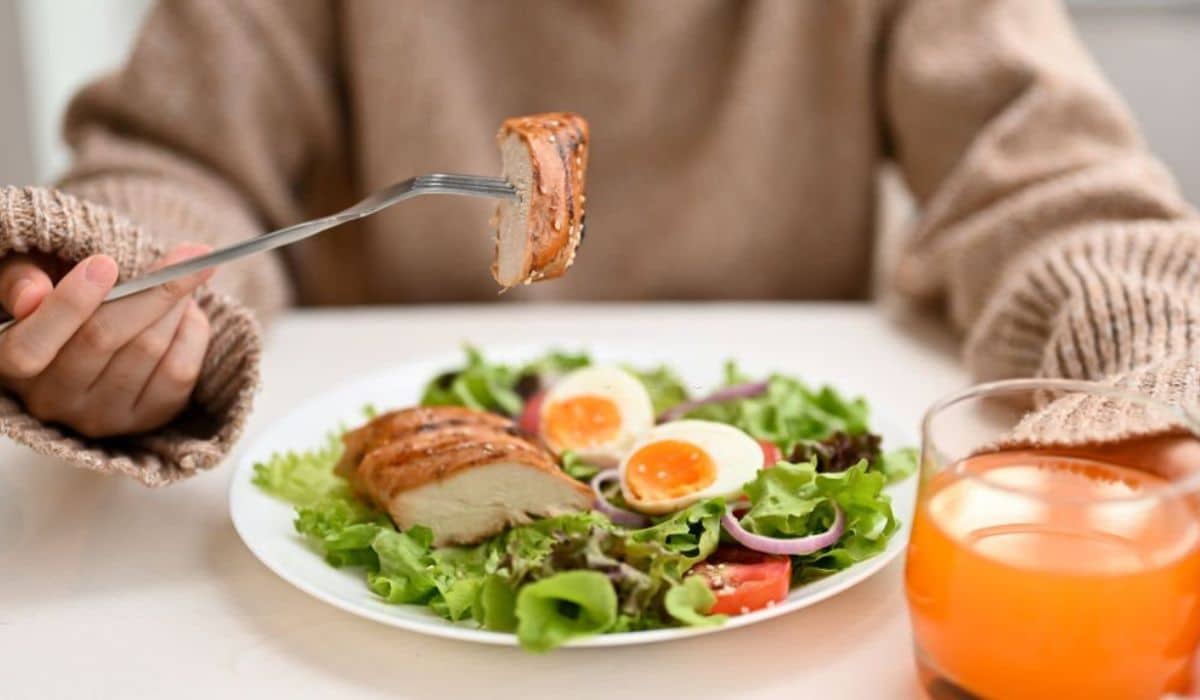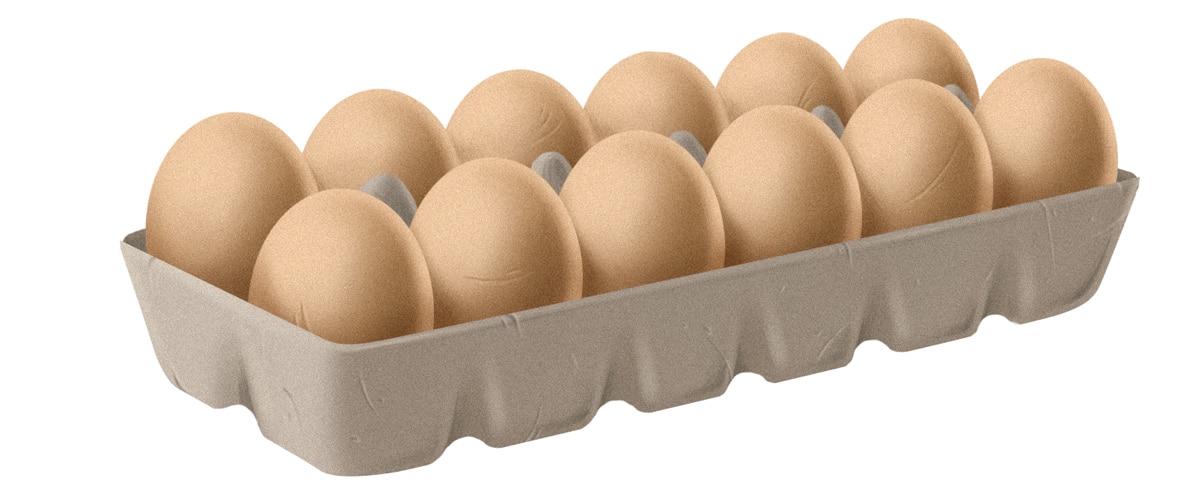
Oats have a reputation as “health food,” but have you ever actually looked up the nutrition facts on oatmeal? The health food rep is probably because oats very little fat, no cholesterol, and lots of fiber - which is fine, except that dietary fat and cholesterol aren’t bad for you, so they’re nothing to spend time and energy avoiding. Fiber is fine, but it’s not like oats are the only source of fiber around - there are lots of fruits and vegetables (including low-carb options) that get you there.
That leaves vitamins and minerals, and here again, oatmeal isn’t really much to write home about. Or to put it differently, you can get a lot more nutrition from most Paleo-friendly breakfasts. Let’s assume that an average “bowl of oatmeal” is made from about 1 cup of dry oats (this will give you several cups of actual breakfast once you mix it with water). We’ll assume that these are plain oats, not some instant packet full of brown sugar, maple syrup, edible “Dinosaur eggs,” fake fruit, and corn syrup. We won’t count mix-ins like fruit or nuts, because if you’re eating Paleo and you want the nutrition in fruit or nuts, you can just eat them without any oats attached.

Below, take a look at four Paleo-friendly breakfasts and how they stack up against oats, nutritionally speaking. Each comparison includes:
- Protein, fat, and net carbs (macronutrients).
- All of the nutrients where the oats hit 10% or more of the RDA. (Sure, the RDA is very imperfect, but it’s more understandable than micrograms and milligrams, so it's here as rough but understandable proxy.)
- All of the nutrients where the Paleo breakfast hits 10% or more of the RDA
- Which breakfast "wins" or "loses" for each nutrient.
1. Easy Omelet
The simplest of classic Paleo breakfasts - for the sake of argument, we’ll say that an average omelet has 3 eggs, 1 cup of raw spinach (that would cook down to a lot less than 1 cup in the pan), and half a cup of chopped onions. The more extra vegetables you throw in there, the more nutritious it'll end up! We’ll assume you cook it in a tablespoon of butter. Here’s a comparison of that omelet to the bowl of oats:
| Oats | Omelet | |
| Net carbs (grams) | 47 | 9 |
| Fat (grams) | 5 | 26 |
| Protein (grams) | 10 | 21 |
| Micronutrients (%RDA) - oats win |
B1 (34%) Copper (16%) Magnesium (28%) Manganese (147%) Zinc (20%) |
B1 (12%) Copper (9%) Magnesium (13%) Manganese (20%) Zinc (15%) |
| Micronutrients (% RDA) - omelet wins |
B2 (11%) B5 (18%) Iron (19%) Phosphorus (33%) Vitamin B6 (6%) Vitamin E (2%) Calcium (6%) Vitamin A (0%) Folate (6%) |
B2 (70%) B5 (49%) Iron (20%) Phosphorus (40%) Vitamin B6 (33%) Vitamin E (17%) Calcium (19%) Vitamin A (80%) Folate (37%) |
The omelet contains a decent amount of pretty much everything in the oats - and it also has significant amounts of five other micronutrients (B6, E, calcium, vitamin A, and folate) that you can’t get from oats in large amounts.
2. Breakfast Potatoes with Bacon

Not in an egg kind of mood? No problem! Potatoes aren’t keto-friendly, but they're the perfect way to refuel after a hard early-morning workout - or charge up for something big later in the day. Nutrition information is based on one large potato (yes, white potatoes are Paleo - although you could also use sweet), 3 rashers of bacon, half a cup of onions, and a bit of wilted Swiss Chard per person. Cut the potatoes, roast or pan-fry as you please, and stir in the chard at the last minute. Season with cumin, paprika, salt, and pepper. Fry up the bacon to your desired crispiness and enjoy!
If you want a lower carb count, you could replace the potatoes with any other favorite vegetable. Broccoli fried in bacon fat is delicious for breakfast!
| Oats | Potatoes | |
| Net carbs (grams) | 47 | 65 |
| Fat (grams) | 5 | 9 |
| Protein (grams) | 10 | 17 |
| Micronutrients (%RDA) - oats win |
Manganese (147%) Zinc (20%) |
Manganese (50%) Zinc (15%) |
| Micronutrients (% RDA) - tie |
B1 (34%) |
B1 (34%) |
| Micronutrients (%RDA) - potatoes win |
B2 (11%) B5 (18%) Copper (16%) Iron (19%) Magnesium (28%) Phosphorus (33%) Vitamin B3 (7%) Vitamin B6 (6%) Vitamin A (0%) Vitamin K (2%) Calcium (6%) Potassium (6%) |
B2 (25%) B5 (33%) Copper (29%) Iron (20%) Magnesium (39%) Phosphorus (50%) Vitamin B3 (54%) Vitamin B6 (75%) Vitamin A (90%) Vitamin K (674%) Calcium (12%) Potassium (46%) |
The worst you can say for the potatoes is that they “only” contain half the RDA of manganese...not exactly a damning criticism. The potassium is particularly notable for people concerned about blood pressure.
3. Stuffed Peppers
Breakfast stuffed peppers - assuming that each person will eat one pepper, here’s the nutrition for a single stuffed pepper, compared to a bowl of oats.
| Oats | Stuffed peppers | |
| Net carbs (grams) | 47 | 13 |
| Fat (grams) | 5 | 19 |
| Protein (grams) | 10 | 19* |
| Micronutrients (%RDA) - oats win |
B1 (34%) Magnesium (28%) Manganese (147%) Phosphorus (33%) |
B1 (23%) Magnesium (18%) Manganese (30%) Phosphorus (45%) |
| Micronutrients - tie |
Copper (16%) |
Copper (16%) |
| Micronutrients (%RDA) - peppers win |
B2 (11%) B5 (18%) Iron (19%) Zinc (20%) Vitamin B3 (7%) Vitamin B6 (6%) Vitamin B12 (0%) Choline (8%) Folate (6%) Vitamin A (0%) Vitamin C (0%) Vitamin E (2%) |
B2 (73%) B5 (53%) Iron (21%) Zinc (26%) Vitamin B3 (28%) Vitamin B6 (67%) Vitamin B12 (42%) Choline (77%) Folate (50%) Vitamin A (181%) Vitamin C (91%) Vitamin E (31%) |
* (Not a typo - fat and protein both happen to be 19 grams for this recipe)
Take a look at that list of nutrients you can only get from the stuffed peppers! Turns out vegetables are pretty nutritious; who knew! The choline here is significant because it's so good for heart health.
4. Smoked Salmon with Avocado
For the egg-haters (or the egg-allergic), try a few slices of smoked salmon with half an avocado - keto folks who like to do dairy can add some cream cheese to the salmon and make tasty miniature salmon-cream cheese pinwheels out of them. Nutrition information below is for 4 ounces of smoked salmon (that’s a few slices), with 3 tbsp. of cream cheese, half an avocado, and a few cherry tomatoes thrown on the side for good measure.
| Oats | Salmon | |
| Net carbs (grams) | 47 | 5.2 |
| Fat (grams) | 5 | 28 |
| Protein (grams) | 10 | 26 |
| Micronutrients (% RDA) - oats win |
B1 (34%) Iron (19%) Magnesium (28%) Manganese (147%) Phosphorus (33%) Zinc (20%) |
B1 (11%) Iron (12%) Magnesium (13%) Manganese (12%) Phosphorus (41%) Zinc (8%) |
| Notable micronutrients - salmon wins |
B2 (11%) B5 (18%) Copper (16%) Vitamin A (0%) Vitamin B3 (7%) Vitamin B6 (4%) Vitamin B12 (0%) Choline (8%) Folate (6%) Vitamin E (2%) Potassium (6%) |
B2 (29%) B5 (46%) Copper (22%) Vitamin A (27%) Vitamin B3 (54%) Vitamin B6 (43%) Vitamin B12 (162%) Choline (30%) Folate (20%) Vitamin E (24%) Potassium (17%) |
Oats aren’t actually that great
Are they better than Cinnamon Toast Crunch? Absolutely. But are they the best you can do? Far from it! Oats aren’t actually that great, nutritionally speaking, and there’s no reason to be worried about missing them. You can get better nutritional value - most notably a broader range of nutrients - from lots of Paleo and keto-friendly meals.





Leave a Reply